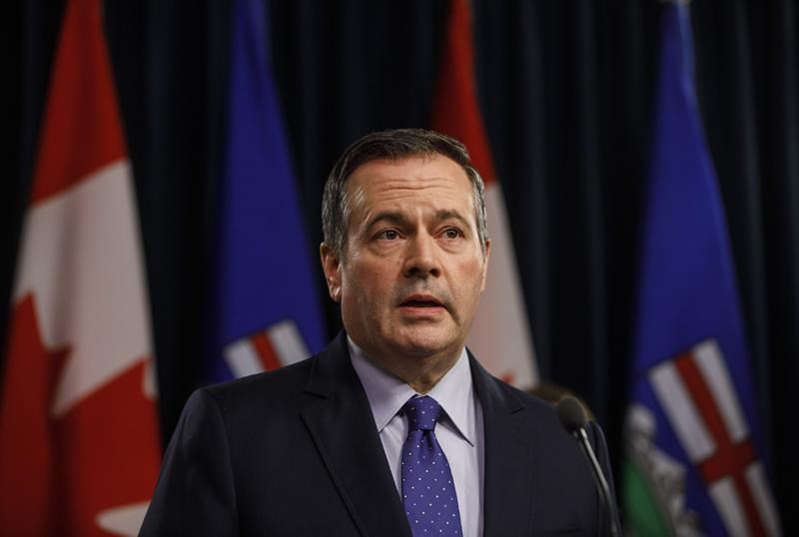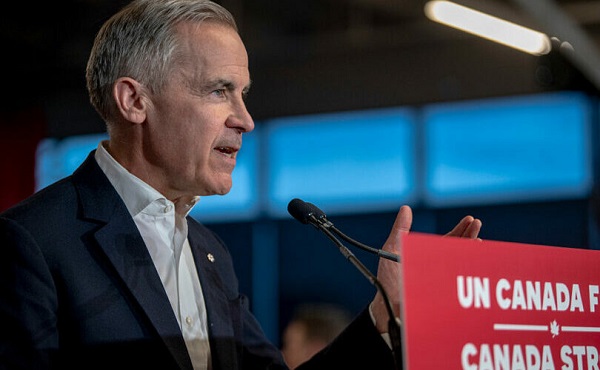Alberta
Alberta justice minister hikes fines, promises renewed effort on COVID-19 scofflaws

EDMONTON — Alberta has doubled fines for disobeying public health measures meant to fight COVID-19 and Justice Minister Kaycee Madu is promising a renewed effort to stop public health scofflaws will succeed.
“Enforcement will be done, and Albertans will see it being done,” Madu told a news conference Wednesday.
“It has become clear that there are a small few who refuse to comply with reasonable and legitimate public health orders”
The United Conservative government passed an order in council Wednesday that doubles fines for public health violations to $2,000.
Madu said there is also a new protocol for health officials, police and government to co-ordinate and target repeat individuals and groups that flout the law.
He said he discussed with police chiefs this week what further tools and resources they need to step up enforcement.
Premier Jason Kenney on Tuesday announced stronger measures to reverse soaring COVID-19 cases that threaten to overwhelm hospitals by month’s end and to force doctors to decide which patients get life-saving care.
Kenney’s government has been criticized for being a paper tiger on lawbreakers. In January, it allowed some restaurants to flout dine-in restrictions. GraceLife church, in Spruce Grove, Alta., west of Edmonton, was able to hold Sunday services for months that officials have said ignored rules on masks, capacity limits and physical distancing. Police physically blocked off the church just a month ago.
The enforcement issue made headlines again on this weekend when hundreds of people gathered near Bowden in central Alberta for a pre-advertised maskless “No More Lockdowns” protest rodeo.
Edmonton and Calgary have also seen maskless mass protests against health restrictions.
Action was taken Wednesday against one accused repeat offender. Alberta Health Services announced the Whistle Stop Café in Mirror, Alta., had been physically closed and access barred. The café had been flagged for repeatedly breaking COVID-19 health restrictions by staying open and serving customers.
Opposition NDP Leader Rachel Notley said Kenney’s government set its enforcement policy up for failure from the get-go by stressing education first and enforcement as a last resort.
Referring to the protocol Madu outlined, Notley said: “The fact there is a protocol to tell them to talk to each other is not new. It is a policy dressed up to look like action, but it is not significant, and that’s why we’re calling on them to do more.”
She criticized the plan to target only repeat offenders: “(That) says to me their plan is to give everybody their first rodeo free, which is in effect what they did with the Bowden rodeo.
“This has to stop because that Bowden rodeo will turn out to be a super-spreader. People will get sick from that rodeo. People will get seriously ill.”
Kenney announced tighter rules Tuesday, some of which came in effect Wednesday. Outdoor gatherings, which had been limited to 10 people, are now capped at five. Worship services, which were allowed at 15 per cent capacity, have been reduced to 15 people maximum.
Retailers, which had been open at 15 per cent customer capacity, are restricted to 10 per cent.
On Friday, all kindergarten to Grade 12 students will learn from home. On Sunday, restaurants must close their patios and offer takeout service only. Personal wellness services, including hair salons and barber shops, will have to close.
Indoor social gatherings remain banned. Entertainment venues, including movie theatres and casinos, also remain closed.
As of Wednesday, Alberta had 24,156 active cases of COVID-19, with 666 people in hospital. It has experienced the highest infection rates in North America in recent weeks.
There are almost 1.7 million Albertans who have received at least one dose of vaccine. About one in three adults have had a shot.
Kenney said the vaccination rollout will be expanded drastically, with everyone in the province 12 and older to soon be eligible.
Every Albertan born in 1991 or earlier will be able to book vaccinations starting Friday. On Monday, appointments will be offered to anyone born between 2009 and 1992.
Earlier Wednesday, Health Canada approved the Pfizer-BioNTech vaccine for children as young as 12.
This report by The Canadian Press was first published May 5, 2021.
Dean Bennett, The Canadian Press
Alberta
Alberta takes big step towards shorter wait times and higher quality health care

From the Fraser Institute
On Monday, the Smith government announced that beginning next year it will change the way it funds surgeries in Alberta. This is a big step towards unlocking the ability of Alberta’s health-care system to provide more, better and faster services for the same or possibly fewer dollars.
To understand the significance of this change, you must understand the consequences of the current (and outdated) approach.
Currently, the Alberta government pays a lump sum of money to hospitals each year. Consequently, hospitals perceive patients as a drain on their budgets. From the hospital’s perspective, there’s little financial incentive to serve more patients, operate more efficiently and provide superior quality services.
Consider what would happen if your local grocery store received a giant bag of money each year to feed people. The number of items would quickly decline to whatever was most convenient for the store to provide. (Have a favourite cereal? Too bad.) Store hours would become less convenient for customers, alongside a general decline in overall service. This type of grocery store, like an Alberta hospital, is actually financially better off (that is, it saves money) if you go elsewhere.
The Smith government plans to flip this entire system on its head, to the benefit of patients and taxpayers. Instead of handing out bags of money each year to providers, the new system—known as “activity-based funding”—will pay health-care providers for each patient they treat, based on the patient’s particular condition and important factors that may add complexity or cost to their care.
This turns patients from a drain on budgets into a source of additional revenue. The result, as has been demonstrated in other universal health-care systems worldwide, is more services delivered using existing health-care infrastructure, lower wait times, improved quality of care, improved access to medical technologies, and less waste.
In other words, Albertans will receive far better value from their health-care system, which is currently among the most expensive in the world. And relief can’t come soon enough—for example, last year in Alberta the median wait time for orthopedic surgeries including hip and knee replacements was 66.8 weeks.
The naysayers argue this approach will undermine the province’s universal system and hurt patients. But by allowing a spectrum of providers to compete for the delivery of quality care, Alberta will follow the lead of other more successful universal health-care systems in countries such as Australia, Germany, the Netherlands and Switzerland and create greater accountability for hospitals and other health-care providers. Taxpayers will get a much better picture of what they’re paying for and how much they pay.
Again, Alberta is not exploring an untested policy. Almost every other developed country with universal health care uses some form of “activity-based funding” for hospital and surgical care. And remember, we already spend more on health care than our counterparts in nearly all of these countries yet endure longer wait times and poorer access to services generally, in part because of how we pay for surgical care.
While the devil is always in the details, and while it’s still possible for the Alberta government to get this wrong, Monday’s announcement is a big step in the right direction. A funding model that puts patients first will get Albertans more of the high-quality health care they already pay for in a timelier fashion. And provide to other provinces an example of bold health-care reform.
Alberta
Alberta’s embrace of activity-based funding is great news for patients

 From the Montreal Economic Institute
From the Montreal Economic Institute
Alberta’s move to fund acute care services through activity-based funding follows best practices internationally, points out an MEI researcher following an announcement made by Premier Danielle Smith earlier today.
“For too long, the way hospitals were funded in Alberta incentivized treating fewer patients, contributing to our long wait times,” explains Krystle Wittevrongel, director of research at the MEI. “International experience has shown that, with the proper funding models in place, health systems become more efficient to the benefit of patients.”
Currently, Alberta’s hospitals are financed under a system called “global budgeting.” This involves allocating a pre-set amount of funding to pay for a specific number of services based on previous years’ budgets.
Under the government’s newly proposed funding system, hospitals receive a fixed payment for each treatment delivered.
An Economic Note published by the MEI last year showed that Quebec’s gradual adoption of activity-based funding led to higher productivity and lower costs in the province’s health system.
Notably, the province observed that the per-procedure cost of MRIs fell by four per cent as the number of procedures performed increased by 22 per cent.
In the radiology and oncology sector, it observed productivity increases of 26 per cent while procedure costs decreased by seven per cent.
“Being able to perform more surgeries, at lower costs, and within shorter timelines is exactly what Alberta’s patients need, and Premier Smith understands that,” continued Mrs. Wittevrongel. “Today’s announcement is a good first step, and we look forward to seeing a successful roll-out once appropriate funding levels per procedure are set.”
The governments expects to roll-out this new funding model for select procedures starting in 2026.
* * *
The MEI is an independent public policy think tank with offices in Montreal, Ottawa, and Calgary. Through its publications, media appearances, and advisory services to policymakers, the MEI stimulates public policy debate and reforms based on sound economics and entrepreneurship.
-

 2025 Federal Election1 day ago
2025 Federal Election1 day agoRCMP memo warns of Chinese interference on Canadian university campuses to affect election
-

 2025 Federal Election1 day ago
2025 Federal Election1 day agoResearchers Link China’s Intelligence and Elite Influence Arms to B.C. Government, Liberal Party, and Trudeau-Appointed Senator
-

 Justice2 days ago
Justice2 days agoCanadian government sued for forcing women to share spaces with ‘transgender’ male prisoners
-

 Alberta2 days ago
Alberta2 days agoAlberta takes big step towards shorter wait times and higher quality health care
-

 Energy2 days ago
Energy2 days agoTrump signs four executive orders promoting coal industry
-

 COVID-1924 hours ago
COVID-1924 hours agoFauci, top COVID officials have criminal referral requests filed against them in 7 states
-

 2025 Federal Election23 hours ago
2025 Federal Election23 hours agoMark Carney vows to provide sterilizing puberty blockers to children ‘without exception’
-

 2025 Federal Election1 day ago
2025 Federal Election1 day agoThe status quo in Canadian politics isn’t sustainable for national unity










